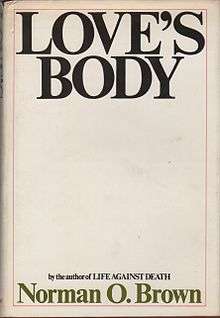Love's Body
Love's Body is a 1966 book about philosophy by the American classicist Norman O. Brown. The work develops themes explored by Brown in his previous book, Life Against Death (1959). The book was first published in the United States by Random House.
 Cover of the first edition | |
| Author | Norman O. Brown |
|---|---|
| Country | United States |
| Language | English |
| Subject | Philosophy |
| Publisher | Random House |
Publication date | 1966 |
| Media type | Print (Hardcover and Paperback) |
| Pages | 276 |
| ISBN | 978-0520071063 |
Summary
Brown describes Love's Body as a continuation of his project in his previous work, Life Against Death (1959), noting that its themes were foreshadowed by the last chapter of that work, "The Resurrection of the Body". In Love's Body, Brown discusses the work of Sigmund Freud, the founder of psychoanalysis, in relation to philosophy and the theory of the social contract. He compares Freud's views in Moses and Monotheism (1939) to those of the philosopher Sir Robert Filmer in Patriarcha (1680), arguing that Freud and Filmer both identified "patriarchy and monarchy, political and paternal power." He also discusses the philosopher John Locke.[1]
Publication history
Love's Body was first published in 1966 by Random House. The book was republished in 1990 by the University of California Press.[2]
Reception
Love's Body was criticized by the philosopher Herbert Marcuse in the February 1967 issue of Commentary. Marcuse criticized Brown's use of religious symbolism, arguing that while Brown tried to give it a sexual significance, it resulted in the "spiritualization of sexuality" and the reduction of sexuality to something symbolic.[3] Brown's reply to Marcuse appeared in the March 1967 issue of Commentary.[4]
The author Sam Keen noted that Love's Body is very different in approach and style from Life Against Death, in that it abandoned "rational arguments" for "aphorism, poetry, and free association".[5] Brown commented that while writing Love's Body, he felt an obligation to "undo what I had done in Life Against Death" and to "release any followers I had acquired or at least to confuse them".[6] The historian Paul Robinson maintained that Love's Body reveals that psychoanalysis was only a stage in Brown's development toward religious mysticism. He observed that while the book contains "a racy (and confusing) display of sexual rhetoric", its erotic language is "largely metaphorical". He argued that Love's Body made explicit the "antipolitical assumptions" implicit in Life Against Death.[7]
The critic Camille Paglia identified Love's Body as "one of the most famous and influential books of my college years."[8]
References
- Brown 1990, pp. ix, 3–4.
- Brown 1990, p. iv.
- Marcuse 1972, pp. 227–243.
- Brown 1972, pp. 243–247.
- Keen 1974, p. 29.
- Bennis & Brown 1974, p. 33.
- Robinson 1990, pp. 233–234.
- Paglia 1993, p. 140.
Bibliography
- Books
- Bennis, Warren; Brown, Norman O. (1974). "Norman O. Brown's Body: A Conversation with Norman O. Brown". In Keen, Sam (ed.). Voices and Visions: Talks by Sam Keen. New York, Evanston, San Francisco, London: Harper & Row. ISBN 0-06-064260-2.CS1 maint: ref=harv (link)
- Brown, Norman O. (1972). "A Reply to Herbert Marcuse". Negations: Essays in Critical Theory. Harmondsworth: Penguin Books. ISBN 0 14060008 6.CS1 maint: ref=harv (link)
- Brown, Norman O. (1990). Love's Body. Berkeley, Los Angeles, London: University of California Press. ISBN 0-520-07106-9.CS1 maint: ref=harv (link)
- Keen, Sam (1974). "Norman O. Brown's Body: A Conversation with Norman O. Brown". In Keen, Sam (ed.). Voices and Visions: Talks by Sam Keen. New York, Evanston, San Francisco, London: Harper & Row. ISBN 0-06-064260-2.CS1 maint: ref=harv (link)
- Marcuse, Herbert (1972). Negations: Essays in Critical Theory. Harmondsworth: Penguin Books. ISBN 0 14060008 6.CS1 maint: ref=harv (link)
- Paglia, Camille (1993). Sex, Art, and American Culture: Essays. London: Penguin Books. ISBN 0-14-017209-2.CS1 maint: ref=harv (link)
- Robinson, Paul (1990). The Freudian Left. Ithaca and London: Cornell University Press. ISBN 0-8014-9716-7.CS1 maint: ref=harv (link)